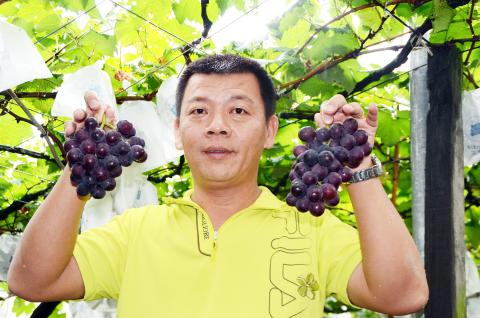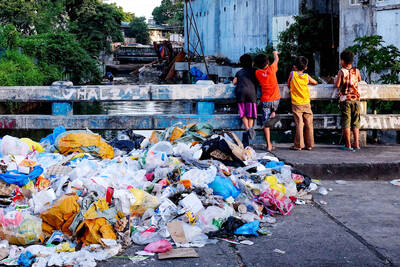At this time of year, if you’re hanging out for some “hen bang e” grapes, Changhua County’s Dancun Township is the place to go.
Dancun was the first area to grow Japanese kyoho grapes in Taiwan. Although Dancun produces a large crop of kyoho grapes, the quality is excellent and many vineyards catering to tourists allow visitors to experience the fun of picking grapes for themselves. “‘Hen bang e’ is a homonym in Taiwanese for “pick-your-own,” says the smiling owner of Dreamer’s Tourist Vineyard, Lai Chang-jui.
To ensure visitors to his vineyard eat healthy grapes, Lai uses organic farming techniques, plant-based organic liquid compost and no herbicides. Lai also lets chickens and ducks, which feed on insects, roam freely on the farm to reduce insect damage to his crop. Also, due to a lack of rain, this year Lai says his grapes have grown particularly large and sweet; to eat, they are firm and chewy, fragrant and sweet.

Photo: Yen Hung-chun, Liberty Times
照片:自由時報記者顏宏駿
In the ten years Lai has run his pick-your-own vineyard, visitors have come from all over Taiwan including from abroad to have a go. Lai recommends fruit picking as a great interactive activity for the family, and says the grape picking season runs until approximately the end of July.
If you want to pick grapes, you can also go to Iku Vineyards & Gasthof Vitis. This vineyard also features over one hectare of kyoho grape vines and a guesthouse. Owner Lai Wei-chih also explains the science behind grapes with explanatory talks and guidance for visitors.
According to Lai, when picking kyoho grapes, it is not simply a case of selecting the biggest ones. Grapes should have a deep purple or redish-black color and luster, says Lai, and the more “bloom” — a powdery-white coating on the surface of the grape — the better. Lai also gives the tip that bunches with between 30-40 grapes on them will be the sweetest.
(L iberty Times, translated by Edward Jones)
「想要吃『很慢ㄟ』葡萄,在這個季節來彰化縣的大村就對了。」
大村是台灣最早種植巨峰葡萄的所在,不但產量多、品質佳,更有許多觀光葡萄園開放讓遊客體驗自採樂趣,「『很慢ㄟ』就是諧音台語『現採』的意思啦!」黑匠(峻茂)葡萄觀光果園老闆賴昶睿笑著說。
為了讓遊客吃得健康,賴昶睿以草生自然農法栽培,施用植物性有機液肥,不用除草劑,放任雞鴨在園區吃蟲減少蟲害,加上今年雨水少,葡萄長得又大又甜,而且果肉吃起來香甜有彈性。
賴昶睿說,開放採果十多年來,吸引各地甚至國外遊客採摘,也是最棒的親子交流活動,約可採至七月下旬。
想要採摘葡萄,也可以到雅育休閒農場。該農場除有種植一公項的巨峰葡萄,也有經營民宿。主人賴偉志還會幫遊客導覽解說認識葡萄生態。
他說,採果時不必挑選大顆,但須色澤深紫或黑紅,果粉愈濃愈好,每串約三十到四十顆甜度最佳。
(自由時報記者顏永欽)

Talks aimed at striking a landmark global treaty on plastic pollution fell apart Friday last week as countries failed to find consensus on how the world should tackle the ever-growing scourge. The talks in Geneva — called after the collapse of the fifth and supposedly final round of talks in South Korea late last year — opened on Aug. 5. Negotiators from 185 nations worked beyond last Thursday’s deadline and through the night in an ultimately futile search for common ground. A large bloc wants bold action such as curbing plastic production, while a smaller clutch of oil-producing states want to

Last year, China’s push for the network certificate and internet ID system sparked widespread debate. The internet ID assigns users a unique code linked to their personal information without revealing their full identity, while the network certificate serves as a digital credential, enabling users to verify their identity across various platforms. This bold policy requires Chinese citizens to connect their online activities to their real identities. An internet “real-name system” demands that every user provide their actual identity information before accessing online services. The goal is to prevent online crime, cyberbullying, and harmful content. China has implemented a comprehensive real-name verification

A: Early this month, Taiwanese pitcher Teng Kai-wei of the San Francisco Giants was called up from Triple-A. B: It’s just awesome. Teng became the 17th Taiwanese to be called up to the majors last year. This marks his second call-up. A: And this time, his jersey number has changed from 70 to 66. B: Who else is likely to be moved up next? A: According to the Major League Baseball (MLB) Web site, Lin Yu-min, Zhuang Chen Zhong-ao, Lee Hao-yu and Cheng Tsung-che are all rising new stars. A: 美職舊金山巨人隊本月初決定,將小聯盟3A投手鄧愷威升上大聯盟! B: 太棒了,他去年曾打進大聯盟,是台灣第17位打進大聯盟球員。 A: 上次他大聯盟背號為70號,這次背號則改為66號。 B: 還有哪些台灣選手有機會挑戰大聯盟? A:

A: In addition to Teng Kai-wei, Taiwanese infielder Cheng Tsung-che was called up temporarily to play for the Pittsburgh Pirates in early April. B: Yeah, Cheng is the 18th player in Taiwan’s baseball history to be moved up to the majors. A: Back in 2002, Chen Chin-feng became the first Taiwanese to play in the Major League Baseball (MLB), followed by Tsao Chin-hui, Wang Chien-ming, Kuo Hung-chih, Hu Chin-lung and Lin Che-hsuan. B: Those pioneers were later joined by Lo Chia-jen, C.C. Lee, Ni Fu-te, Chen Wei-yin, Wang Wei-chung, Hu Chih-wei, Tseng Jen-ho, Lin Tzu-wei, Huang Wei-chieh, Yu Chang,